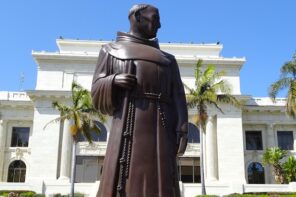First Things describes itself as “America’s most influential journal of religion and public life.” You might not have heard of First Things—the magazine’s circulation wouldn’t drain a bathtub and its web traffic is quite modest—but its slogan is no idle boast.
First Things reports, comments, and offers perspective on the most pressing matters of politics, culture, religion, law, and philosophy from a conservative and (mostly) Catholic perspective. The publication is intellectually very serious—proof that ideas and cosmologies matter in politics.
Alongside the Federalist Society, it’s difficult to imagine a more important repository of the intellectual source code of religious and cultural conservatism in the United States. The foundation of this source code (the motherlode of the code, as it were) is Catholic natural law moral philosophy. Natural law is the 800-year-old Thomist tradition that absorbs (from revelation and scripture) and communicates (into public discourse and legal practice) a quite specific understanding of the human individual as the summit of God’s creation.
First Things has hosted some of the most important debates and produced some of the most fruitful arguments in support of National Conservatism, the insurgent political movement of religious and cultural conservatives aiming to reconstitute politics on “illiberal” or “post-liberal” nationalist (and Christian) foundations.
The primary aim of the National Conservative movement is to reshape national identity around traditional ethnic, family, and religious values and institutions that better reflect humanity as the imago Dei. These are the themes that First Things and the proudly post-liberal authors it publishes such as Sohrab Ahmari, Adrian Vermeule, Patrick Deneen, Peter Thiel, Marco Rubio, Josh Hawley, and J.D. Vance are brazen enough to explore.
First Things founder, Richard John Neuhaus famously wrote that “culture is the root of politics, and religion is the root of culture.” Which is ultimately to say that religion is the root of everything. And that “secularism”—which by definition architects a world without God, and therefore a world with inherently defective and rotten moral foundations—is the root of all evil.
Riffing on Neuhaus (and borrowing from Pope John Paul II), First Things intellectuals will often say that politics is downstream from culture and that culture is downstream from religion. What they usually don’t go on to tell you—at least not openly—is that religion is downstream from politics. In other words, the mission of the Catholic Church is inherently political, and anything but passive.
An influential piece published in First Things in 2017, entitled “Culture is Downstream of Politics,” makes this case, but prosaically, with a focus on the political tactics of the Republican Party heading into the 2018 midterm elections. Since the time of Augustine, Catholicism has developed as a universal, systematic religion, the magisterium as imperium. The political legacy of the Catholic Church, certainly since the Middle Ages, suggests a radical and structural bias toward a powerful state, supported by the Church, that represents the will of God upon earth, and for which the tactics of retail politics are a minor detail within the tapestry.
The freedom and autonomy of individuals that American liberals assume must be the first priority—in economic activity or in religious and cultural practices—is largely a legacy of Reformation Protestantism, with its inherent and recursive tendencies toward fragmentation and motion. Catholicism instinctively recoils from this entropic chaos because it obviates the commitment to first principles and to a divinely ordained order on which a theology and philosophy of morality and virtue depends.
But the Catholic Church also has built into its DNA an all-consuming survival instinct, an awareness that evolution and entropy also are its enemies as an institution. From this fear, certainly for conservative Catholics, flows a consistently urgent desire to control this flux that is absent from nearly every other (non-Abrahamic) religion in the world. For this reason, the conservative Catholic ontology insists that the authority of the Church and the power of the state to enforce this authority on its population are the preconditions for morality and virtue.
The recent intellectual energy surrounding the National Conservative movement is not without precedent. Between 1800 and 1950, Europe endured what amounted to a second Catholic Counter-Reformation. In the latter portion of the 19th century, predominantly Catholic countries in Europe—which of course European nations have largely been since the 1648 Peace of Westphalia—experienced an upsurge of royalist and irredentist passions to which the Catholic Church often attached itself (for example, Carlism in Spain).
In the 20th century, spasms of reaction to war and revolution in many of these same countries produced right-wing political movements across Southern, Central, and Eastern Europe urged on and supported by the Church, which showed itself to be in most cases, if not explicitly fascist, then at least fascist-curious and fascist-adjacent. These Counter-Reformation political movements produced the reactionary and traditionalist political theologies of Joseph de Maistre, Louis de Bonald, Juan Donoso Cortés, Julius Evola, and Carl Schmitt, many of whom happen to be influential among the current crop of National Conservatives.
What we commonly today refer to as illiberalism, and what we see emerging in predominantly Catholic European nations—most notably in Hungary, but also in Poland, Austria, France, and Italy (and in former Soviet Eastern Orthodox nations to the east)—is a response to many of the same dynamics that produced monarchism and fascism in the 19th and 20th centuries: most succinctly, an alliance of clerical, rural, military, aristocratic, and ethnic elements challenging urban, cosmopolitan, educated, secular, and bourgeois “elites.”
Ultimately, power and control are the predicates of morality and virtue. The language of Catholic natural law makes this clear. The telos, or goal, of natural law in politics is power, not freedom; the control of bodies, the control of movement, the control of identity. The support of First Things and its contributors to the scorched-earth educational reforms of Florida governor Ron DeSantis illustrate the challenge of the National Conservative movement for the American Left.
Catholic natural law requires an illiberal state. Until liberals become comfortable with an alternative conception of power, equally robust, but more fully grounded in an ethics of fairness and equality, it will remain difficult to meet the challenges from the Christian Right.
In the meantime, First Things will continue to thrive within its niche as a rooted redoubt of reaction against the flux of times forever out of joint, from which they are doomed to cry, like Hamlet, O cursèd spite / That ever I was born to set it right!





